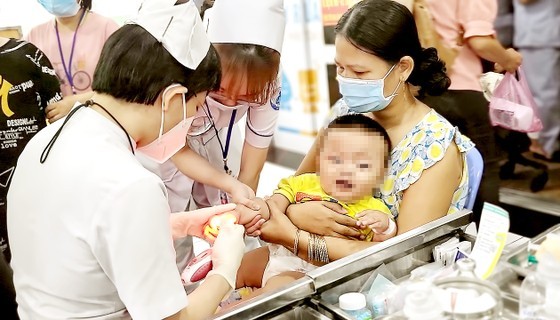 |
Medical workers examine a HFMD baby |
Children's hospitals in Ho Chi Minh City have lately received many cases of hand, foot and mouth disease (HFMD). At Children's Hospital 2, Dr. Nguyen Dinh Quy, deputy head of the Infection Department, said that the department is currently treating 24 inpatients. In addition, the hospital provides also examination and treatment for dozens of hand, foot and mouth outpatients every day.
Elsewhere in the southern metropolis, Dr. Du Tuan Quy, Head of the Children's Hospital 1’s Infection Department, said that the department is currently treating 14 children with HFMD, including 2 severe cases. Though not many children with HFMD have been hospitalized, the rate of severe progression accounts for 30 percent.
This is worrisome because children may face the risk of dangerous complications such as encephalitis, meningitis, pneumonia, and myocarditis.
Symptoms of hand, foot, and mouth disease usually include fever, mouth sores, and skin rash. The rash is commonly found on the hands and feet. Hand, foot, and mouth disease is common in infants and children younger than 5 years old. Most children have mild symptoms for 7 to 10 days.
When a child experiences nausea and vomiting, it is an unusual sign that signals a serious change; or see children with weak arms and legs, parents need to take their children to hospitals immediately. If it's late, the virus will enter the brain, causing encephalitis, which will be difficult to treat and cause complications, said Dr. Quy.
According to Dr. Tran Ngoc Luu, Department of Infection, Children's Hospital 2, many children have recovered from HFMD, but if they are exposed to infectious sources, they still get the disease again because children's immunity to HFMD is not sustainable.
There is no vaccine to protect against the viruses that cause HFMD, so parents should be cautious to keep their children from close contact with sick people. If any children get sick, they should be kept at home to avoid spreading the disease to their classmates. Personal hygiene by washing hands regularly is needed.
























